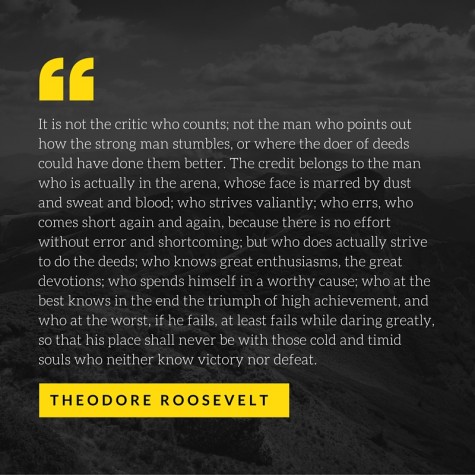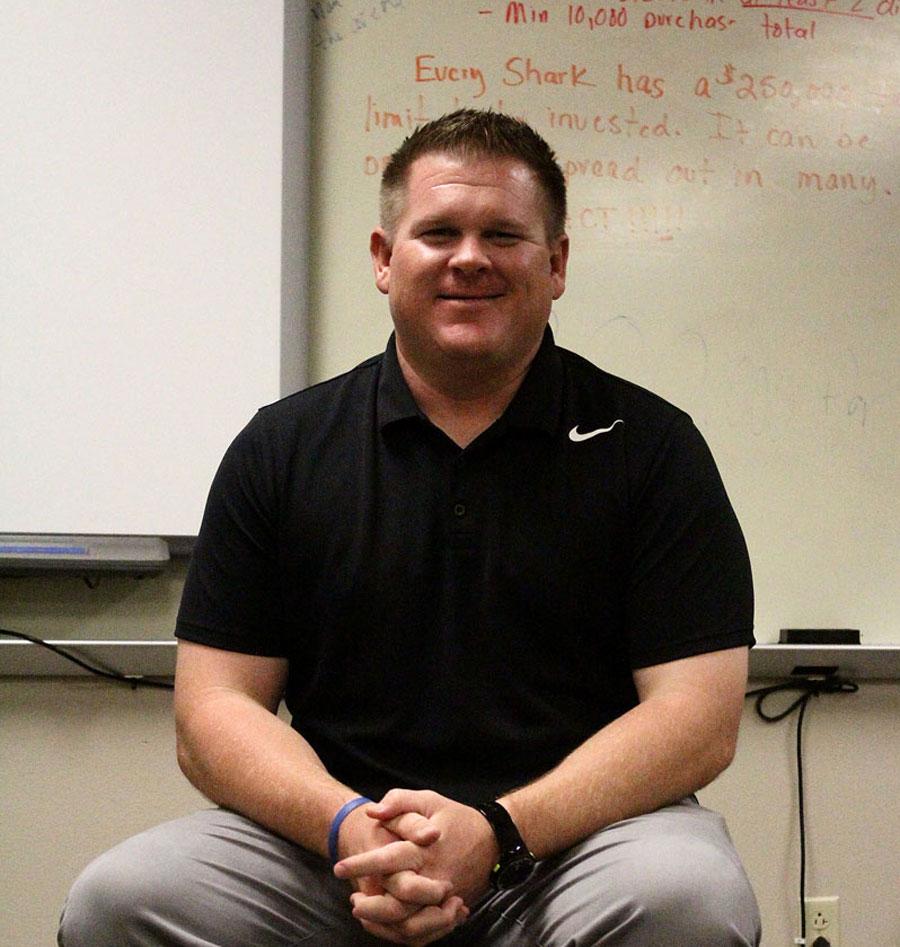Quoting Inspiration
He readies himself for class. Pulls up PowerPoints and prints out worksheets. Turns on the projector and aligns desks into rows. Chooses a quote and writes it on the whiteboard.
For some teachers, getting their classroom ready in the morning is monotonous, pretty much the same every day. But for economics teacher and football coach Tyler Soukup preparing his classroom takes so much more thought.
Over the past year, Soukup has chosen a quote of the day for his class each and every day. The quotes vary from short phrases from Aristotle to lengthy passages from presidential speeches. Soukup writes the quote on the top left of the white board every morning and waits until class time. And that’s when the magic happens.
For the first 5-10 minutes of class, Soukup introduces the quote and explains why he chose it. Sometimes the reason is that it resonated with him during a hard time in his life, and sometimes the quote was given to him by a former student. No matter the reasoning, Soukup always ties the quote to his own life.
And it doesn’t end there. Soukup then opens the discussion up to the class, encouraging them to share how the quote makes them feel. Often, students will share a personal detail of their life, welcoming a heartfelt connection amongst the students. For Soukup, this connection is the reason he keeps the habit.
“It went far beyond what I thought it was going to be,” Soukup said. “I wanted kids to be able to get comfortable with each other and with me quickly. And the fastest way to do that is not to talk about U.S. History or Economics. It’s talking about life. And making connections that we all share, the emotions that we deal with on a daily basis.”
Soukup recognizes that high school students seek individuality, but at the same time students want to find unity in their struggles.
“I think it takes a little maturity sometimes to have those kind of discussions,” Soukup said. “I think if I had had those I wouldn’t have felt a lot of those stresses that teenagers feel. I think I would have understood that that’s part of life and that I’m feeling things that are no different than everybody else in the room is feeling. We all go through these things. Your parents went through these things. It’s a part of life.”
 Over the years, Soukup came in contact with the “Man in the Arena” quote by Theodore Roosevelt and made a strong enough to impression to become his favorite.[/vc_column_text][/vc_column][/vc_row][vc_row][vc_column width=”1/1″][image_with_animation image_url=”10845″ animation=”Fade In” img_link_target=”_self”][/vc_column][/vc_row][vc_row][vc_column width=”1/1″][vc_column_text]“I think that it reminds people to get in, to live life” Soukup said. “To not stand in the back and to not wait for something good to happen, but to be proactive in life and to make things happen. It talks about ‘Would you rather have competed and lost rather than not competing at all?’ And that’s something that I definitely think resonates with me. At the very least you knew what it felt like to put all your effort into something, to compete. Even if you lost … you get the gratification of knowing you put your all out there, and that’s worth a heck of a lot more than not trying at all.”
Over the years, Soukup came in contact with the “Man in the Arena” quote by Theodore Roosevelt and made a strong enough to impression to become his favorite.[/vc_column_text][/vc_column][/vc_row][vc_row][vc_column width=”1/1″][image_with_animation image_url=”10845″ animation=”Fade In” img_link_target=”_self”][/vc_column][/vc_row][vc_row][vc_column width=”1/1″][vc_column_text]“I think that it reminds people to get in, to live life” Soukup said. “To not stand in the back and to not wait for something good to happen, but to be proactive in life and to make things happen. It talks about ‘Would you rather have competed and lost rather than not competing at all?’ And that’s something that I definitely think resonates with me. At the very least you knew what it felt like to put all your effort into something, to compete. Even if you lost … you get the gratification of knowing you put your all out there, and that’s worth a heck of a lot more than not trying at all.”
Along with being a teacher in the classroom, Soukup is a football coach. For Senior Jarrett Farley, a student in Soukup’s classroom and a linebacker, the admiration remains after four years.
“He’s an extremely wise man and he seems to know just about everything.” Farley said. “If I were to go to anyone for advice it would be him. Honestly, it amazes me how he has literally a different quote every day and I’ve had him [as a teacher] for two years and he still hasn’t used the same quote. And for every single quote he has some kind of story that goes along with it. Definitely life-changing.”
Soukup hopes that his students gain more than just self-confidence from this habit, but a different, more intentional way of living.
“I hope that they understand the importance of interpersonal relationships,” Soukup said. “That they understand how to interact with each other in a school of 3,500 kids. How to make that work. That’s an intricate process and … if you don’t give it any thought it can be chaotic. You gotta think about how you treat people and how you live life.”

Senior Hannah Arnold is the managing editor and opinion editor. This is her third year on staff. Along with writing, Hannah enjoys being outside and spending...



